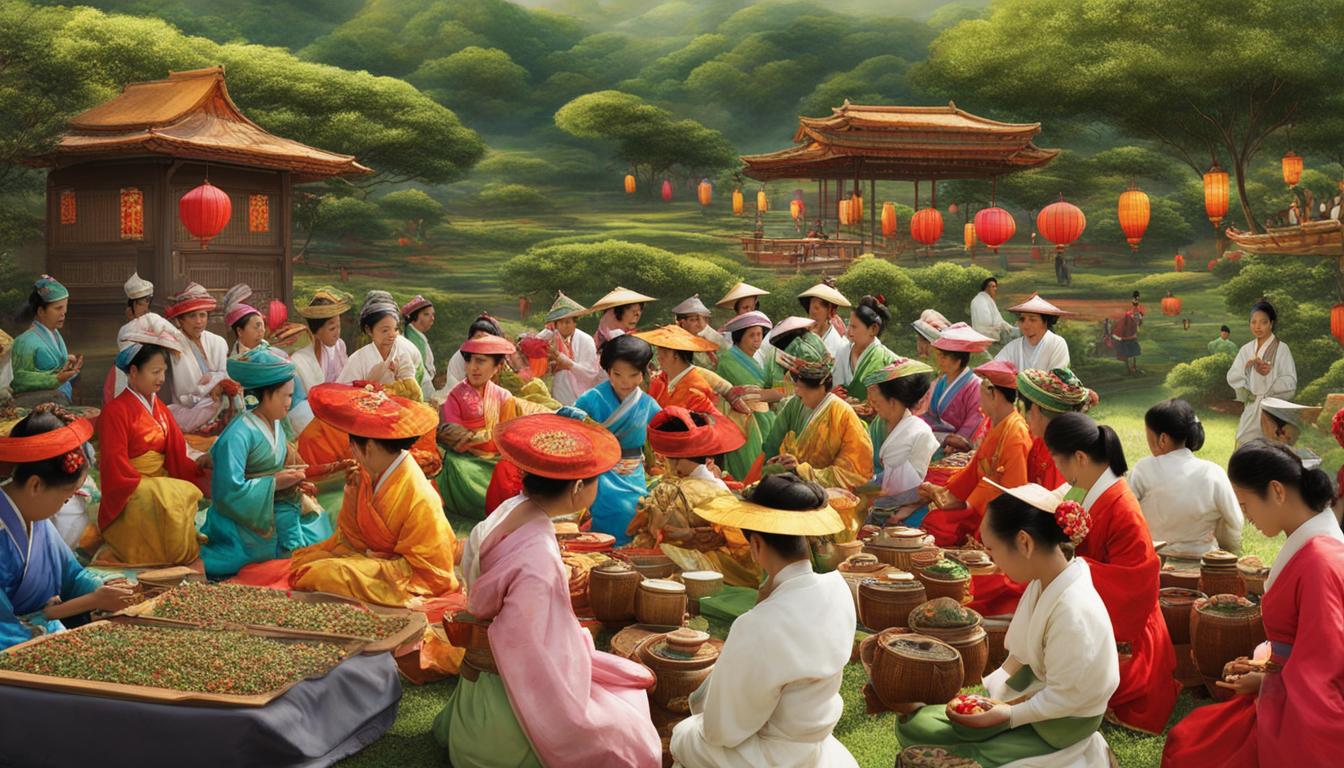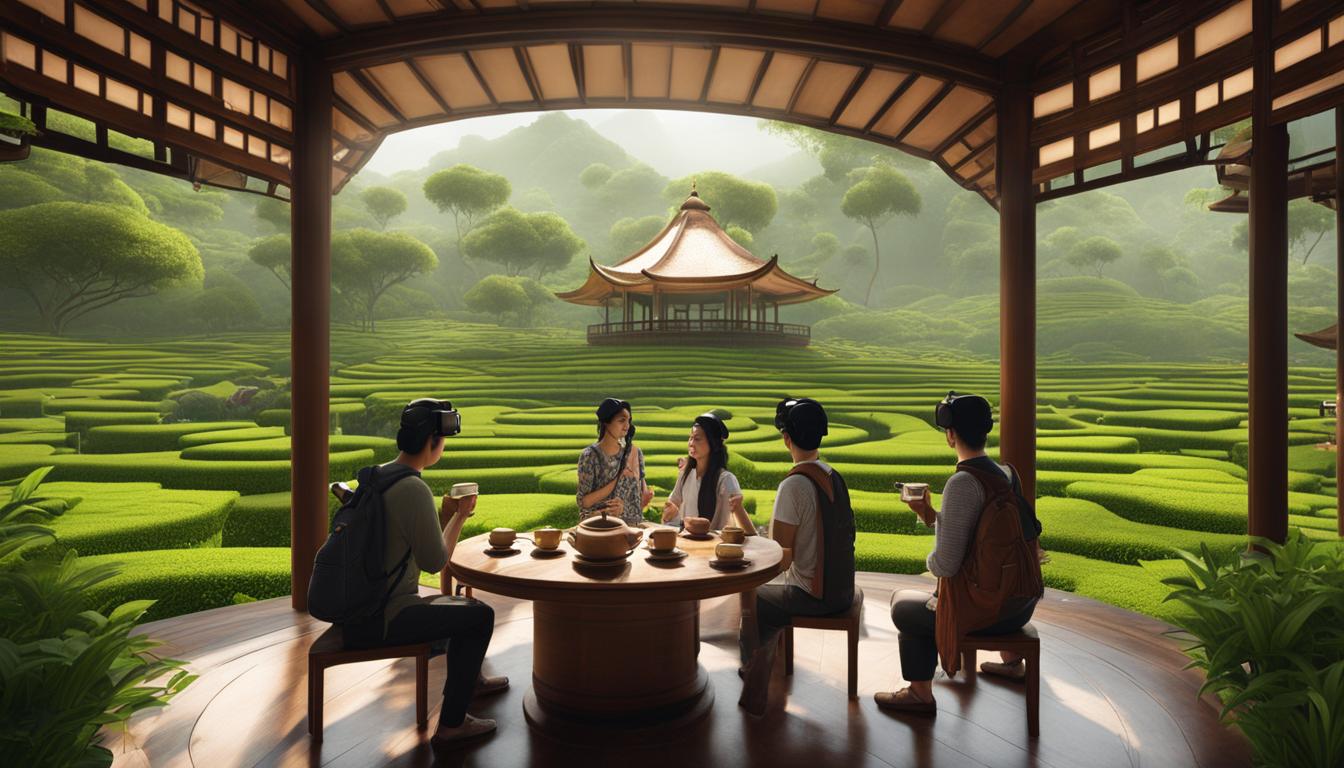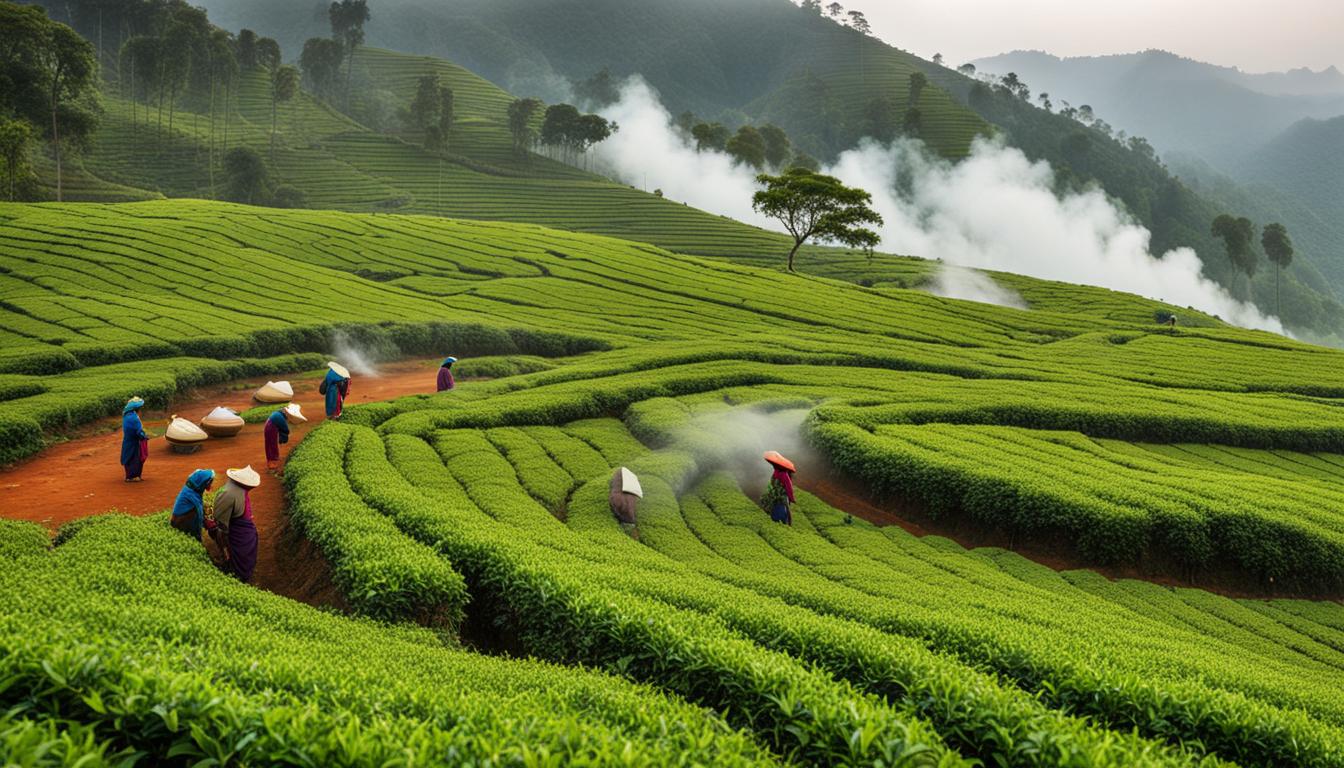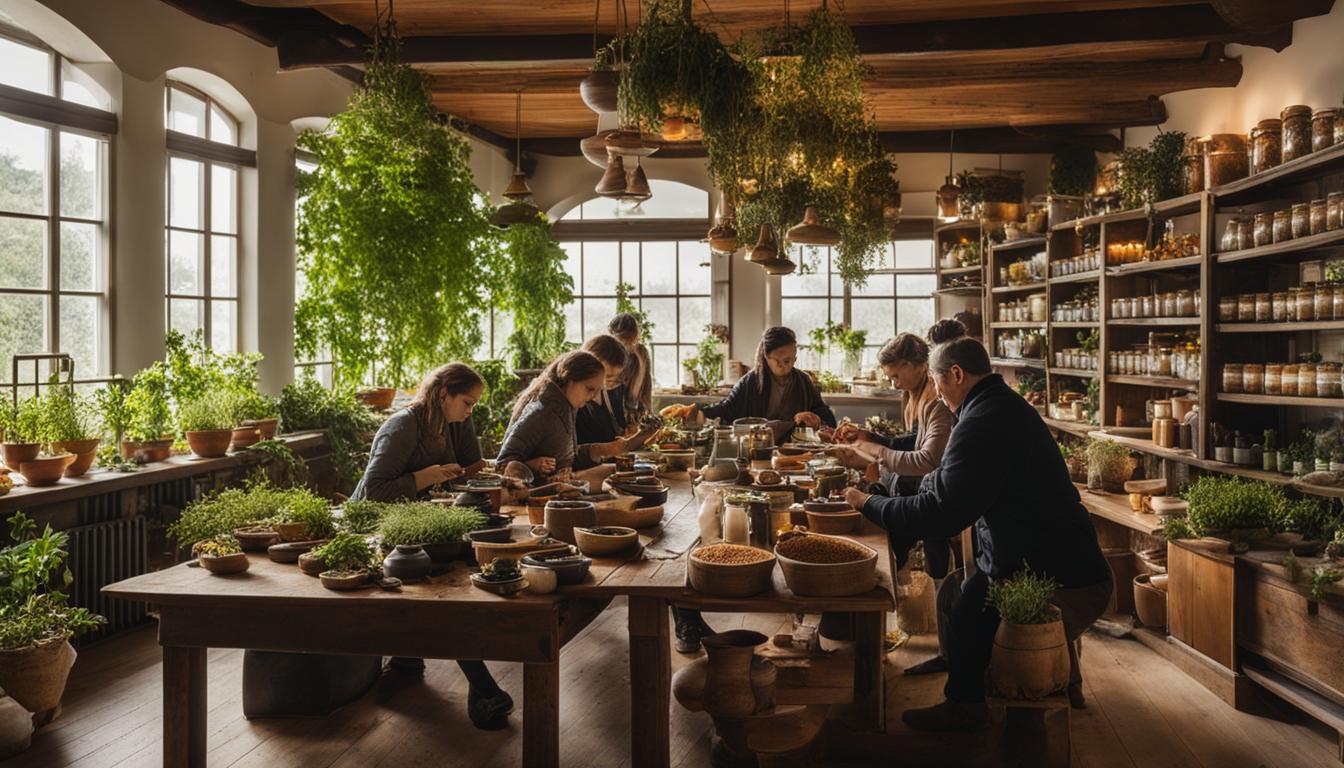Welcome to our journey through the vibrant world of tea festivals at origin estates, where we will immerse ourselves in the rich cultural heritage and traditions that surround tea. These festivals are a celebration of the beauty, flavors, and community that tea production entails. Join us as we explore the unique experiences offered by tea garden cultural festivals, tea estate community celebrations, and more.
Key Takeaways:
- Tea festivals at origin estates showcase the rich cultural heritage and traditions associated with tea.
- These festivals provide a unique opportunity to immerse yourself in the world of tea and experience different tea varieties.
- Tea festivals bring together tea enthusiasts, artisans, and local communities in a celebration of tea culture.
- From tea garden cultural festivals to tea estate community celebrations, these events highlight the diverse flavors and traditions of tea production.
- Tea festivals at origin estates are a must-visit for anyone interested in tea and its cultural significance.
The Transformative Power of Tea: Mindfulness and Well-being
Tea is not just a beverage; it has the profound ability to enhance our well-being and promote mindfulness. Through the practice of mindful tea-drinking, we can tap into the transformative power of this ancient tradition. When we pause to savor each sip of tea, we cultivate a sense of presence and inner peace. The therapeutic benefits of tea, combined with the practice of mindfulness, create a powerful tool for enhancing our mental and emotional well-being.
Tea and meditation have long been interconnected, with tea ceremonies serving as a form of spiritual practice. As we engage in the ritual of preparing and sipping tea, we invite a sense of stillness and tranquility into our lives. The act of brewing tea becomes a mindfulness exercise, where our focus is solely on the present moment. Through this mindful tea-drinking, we can alleviate stress, reduce anxiety, and find solace in the simple pleasures of life.
“Tea is the elixir that nourishes the body, mind, and soul. It is a bridge to inner peace and a reminder to savor life’s moments.”
The Therapeutic Benefits of Tea
Tea is packed with antioxidants and natural compounds that offer a range of therapeutic benefits. From boosting our immune system to improving digestion, tea can support our overall well-being. Different tea varieties, such as green tea, black tea, and herbal infusions, possess unique properties that contribute to their therapeutic effects. For example, green tea contains L-theanine, an amino acid known for its calming and stress-relieving properties, making it an excellent choice for promoting relaxation and mental clarity.
| Tea Variety | Therapeutic Benefits |
|---|---|
| Green Tea | Calming, stress relief, mental clarity |
| Black Tea | Energizing, focus, cardiovascular health |
| Herbal Infusions | Digestive support, relaxation, sleep aid |
“Tea is not just a beverage; it’s a holistic experience that nourishes our mind, body, and soul.”
So, the next time you find yourself reaching for a cup of tea, take a moment to fully immerse yourself in the experience. Embrace the mindfulness and well-being that tea can offer. Let its therapeutic benefits guide you to a place of inner peace and serenity. As we journey through life, let tea be our faithful companion, reminding us to slow down, savor the moment, and find solace in the simple pleasures that truly nourish our souls.
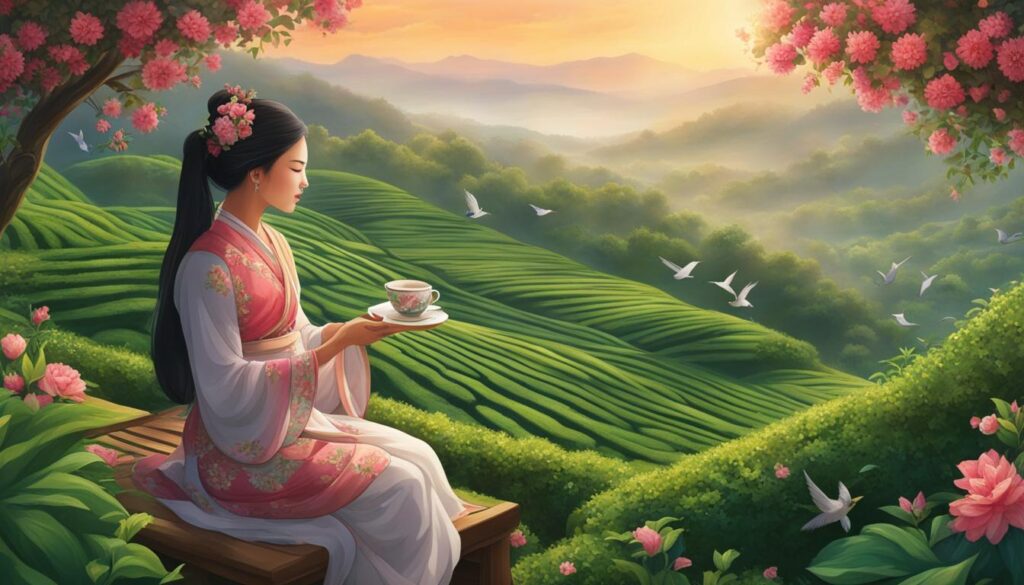
Tea as a Cultural Connector: Bridging Traditions
Tea has long been celebrated as more than just a beverage. It has served as a cultural connector, bringing people from diverse backgrounds together through the shared love for this timeless drink. Across different corners of the world, tea traditions have not only been preserved but also fostered cross-cultural dialogue and understanding.
One of the most fascinating examples of tea’s role as a cultural connector is found in the traditional tea ceremonies of Japan. These meticulously choreographed rituals, such as the renowned Japanese tea ceremony called “sado,” not only showcase the artistry and beauty of tea preparation but also embody the values of harmony, respect, and tranquility. Through these ceremonies, people from all walks of life can come together, transcending language barriers, and appreciating the elegance of this ancient culture.
“Tea is a passport to the world, connecting cultures and fostering understanding.” – Anonymous
Tea has also played a pivotal role in promoting cross-cultural dialogue through the establishment of tea houses and tea rooms. In countries like India, where tea is an integral part of daily life, tea houses have become vibrant hubs for social interactions, where people from different backgrounds gather to share stories, enjoy a cup of tea, and build connections. These spaces not only offer a taste of authentic tea but also serve as platforms for cultural exchange, where ideas and traditions are shared and celebrated.
Exploring the Global Ambassador of Tea
As a global ambassador, tea has the power to transcend borders and create a sense of unity. Through tea, we can appreciate the diverse cultures and traditions that have shaped the world. The tea trade routes of the past, such as the Silk Road, facilitated not only the exchange of goods but also the exchange of ideas, language, and art. Today, tea continues to be a symbol of cultural exchange, with each cup telling a story of its origins and the people who cultivated it.
In our interconnected world, where diversity is celebrated, tea serves as a reminder of our shared humanity. Whether it’s the delicate flavors of green tea from Japan, the robust brew of black tea from India, or the soothing herbal infusions from various cultures, tea connects us to the roots of our heritage while welcoming us into a global community.
| Country | Tea Tradition |
|---|---|
| China | Gongfu Cha – A traditional method of brewing tea with skill and precision. |
| Morocco | Mint Tea – A refreshing blend of green tea, fresh mint leaves, and sugar. |
| England | Afternoon Tea – An elegant affair with finger sandwiches, scones, and a selection of teas. |
| Turkey | Turkish Tea – Served in tulip-shaped glasses, it is a strong black tea enjoyed with sugar. |
| Japan | Matcha Ceremony – A traditional preparation of powdered green tea, performed with grace and precision. |
These tea traditions not only offer a glimpse into the cultural practices of different nations but also provide opportunities for us to engage in cross-cultural conversations. By embracing the diversity of tea culture, we can foster understanding, respect, and appreciation for the traditions that shape our world.
Tea’s Journey: From Diplomacy to Culinary Delights
Tea, with its rich history and cultural significance, has played a pivotal role in fostering diplomatic relations and international trade throughout the ages. From ancient tea caravans traversing the Silk Road to modern-day tea trade agreements, the exchange of this beloved beverage has been a catalyst for cultural exchanges and global connectivity.
In the realm of diplomacy, tea has been the favored drink during negotiations and peace treaties, symbolizing harmony and goodwill. It has provided a platform for leaders to engage in dialogue and bridge cultural divides, fostering understanding and strengthening diplomatic ties.
Tea’s journey across borders has also led to fascinating adaptations and innovations in different regions, giving rise to unique tea customs and culinary delights. From the elaborate tea ceremonies in Japan to the aromatic masala chai in India, tea has been embraced and transformed by various cultures, resulting in a diverse range of tea traditions that delight the senses.
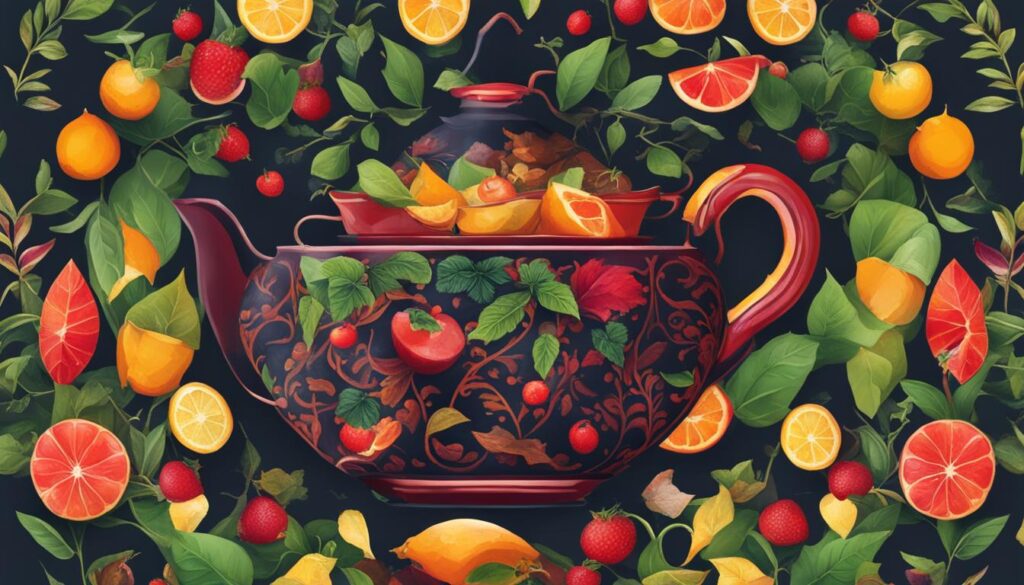
Tea Adaptations Around the World
| Region | Tea Adaptation |
|---|---|
| England | Afternoon Tea: Scones, finger sandwiches, and delicate pastries are served with a pot of black tea. |
| Morocco | Mint Tea: Green tea infused with fresh mint leaves and sweetened with sugar, served in intricately decorated glasses. |
| Taiwan | Bubble Tea: A popular drink with chewy tapioca pearls, served cold with a variety of flavors. |
| Russia | Samovar Tea: A traditional tea brewing device used to make strong, concentrated tea, often served with lemon and sugar. |
“Tea is a universal language that transcends borders, bringing people together and celebrating our shared love for this timeless beverage.” – Unknown
Tea tourism has also gained popularity, offering tea enthusiasts the opportunity to explore tea-growing regions and immerse themselves in the fascinating world of tea cultivation. From visiting picturesque tea estates to participating in tea tastings and tea-pairing workshops, tea tourism provides an unforgettable experience that combines cultural immersion and culinary exploration.
As tea continues to connect cultures and ignite culinary creativity, its journey from diplomacy to culinary delights showcases the enduring power of this humble beverage. It serves as a reminder that in a rapidly changing world, the shared enjoyment of a cup of tea fosters unity, appreciation of diversity, and a celebration of the rich tapestry of human experience.
Innovations in the Tea Industry: Sustaining Tradition and Embracing Sustainability
The tea industry is constantly evolving, with innovative practices aimed at sustaining tradition while embracing sustainability. As consumers become more conscious about the environmental impact of their choices, the tea industry has responded with initiatives to ensure a greener future. One notable innovation is the adoption of sustainable farming practices.
With sustainable farming, tea growers prioritize the health of the land, water, and biodiversity. This approach involves minimizing the use of harmful chemicals, conserving water resources, and promoting organic cultivation methods. By nurturing the ecosystem in which tea is grown, sustainable farming not only ensures the quality and flavor of the tea but also protects the surrounding environment.
In addition to sustainable farming, the tea industry is also exploring eco-friendly packaging solutions. Traditional tea packaging often involves the use of plastic and non-recyclable materials, contributing to waste and pollution. To address this issue, tea companies are turning to innovative packaging alternatives. Biodegradable and compostable materials, such as plant-based PLA or paper-based packaging, are being used to reduce the environmental footprint of tea products.
Furthermore, tea sustainability extends beyond on-farm practices and packaging. The industry is committed to supporting tea-growing communities and promoting social responsibility. This involves fair trade practices, ensuring that farmers receive fair compensation for their labor and that their working conditions are safe and ethical. By investing in the well-being of tea producers, the industry fosters a sustainable supply chain that benefits both the environment and the livelihoods of those involved.
| Key Innovations in the Tea Industry | |
|---|---|
| Sustainable farming practices | Protects the environment and ensures the quality of tea |
| Eco-friendly packaging | Reduces waste and pollution |
| Fair trade practices | Promotes social responsibility and supports tea-growing communities |
“Innovations in the tea industry are not only about creating exceptional flavors and experiences but also about preserving the traditions and resources that make tea so special. By embracing sustainable practices and prioritizing social responsibility, the tea industry is paving the way for a more environmentally conscious and ethical future.” – Industry Expert
Through these innovations, the tea industry is proving that tradition and sustainability can coexist harmoniously. As tea lovers, we have the power to support these initiatives by choosing sustainably produced teas and engaging with tea brands that prioritize environmental and social responsibility. By making mindful choices, we can contribute to a more sustainable and environmentally friendly tea industry for generations to come.
Conclusion
Tea, with its rich cultural heritage and profound impact on our lives, continues to be a source of unity and inspiration. From the tranquil tea ceremonies that promote mindfulness to the vibrant tea houses that bridge cultural divides, tea culture celebrates the beauty and wisdom found within each cup.
The journey through tea’s history, traditions, and innovations is not only soul-enriching but also a reminder of the interconnectedness that tea brings to our world. As we embark on a tea adventure, we discover the threads that connect us to different cultures, to our own heritage, and to the countless generations who have cherished this soul-enriching beverage.
So, whether you are sipping tea alone or sharing it with friends, let its timeless appeal and cultural significance guide you on a unique and fulfilling path. Let tea be a catalyst for unity, a celebration of diversity, and a reminder of our shared humanity. Join us in raising a cup, toasting to the past, present, and future of this extraordinary tea adventure.
FAQ
What are tea festivals at origin estates?
Tea festivals at origin estates are celebrations of the rich cultural heritage and tradition surrounding tea. These festivals bring together tea enthusiasts, artisans, and local communities to showcase the beauty, flavors, and traditions associated with tea production.
What can I expect at a tea festival?
At a tea festival, you can expect to immerse yourself in the world of tea and experience the authentic taste of different tea varieties. From tea garden cultural festivals to tea estate community celebrations, these events offer a unique opportunity to learn about tea production, participate in tea ceremonies, and connect with tea lovers from around the world.
How does tea promote mindfulness and well-being?
Tea has long been revered for its ability to promote mindfulness and well-being. The practice of mindful tea-drinking allows individuals to be fully present in the moment, savoring each sip and experiencing a sense of tranquility. Tea and meditation often go hand in hand, with tea ceremonies serving as a form of spiritual practice.
How does tea bridge traditions and cultures?
Tea has served as a cultural connector, fostering cross-cultural dialogue and understanding. From the traditional tea ceremonies of Japan to the vibrant tea houses of India, tea has played a significant role in bridging traditions and uniting people from different cultures. The exchange of tea traditions and stories has transcended language and boundaries, creating a sense of camaraderie and appreciation for diverse cultures.
How has tea shaped diplomatic relations?
Tea has been instrumental in fostering cultural exchanges and shaping diplomatic relations throughout history. From the ancient Silk Road to modern-day tea trade agreements, tea has served as a catalyst for dialogue and collaboration between nations. It has also undergone fascinating adaptations in different regions, giving rise to diverse tea customs and traditions. Tea tourism has emerged as a popular trend, allowing travelers to explore tea-growing regions and experience the enchanting world of tea cultivation firsthand.
How is the tea industry embracing sustainability?
The tea industry has witnessed remarkable innovations aimed at sustaining tradition while embracing sustainability. From sustainable farming practices to eco-friendly packaging, the industry is committed to preserving the environment and promoting the well-being of tea-growing communities. Initiatives such as reducing carbon footprints, conserving water resources, and promoting biodiversity in tea gardens are transforming the way tea is cultivated and consumed.
What is the significance of tea in our lives?
Tea, with its rich cultural heritage and profound impact on our lives, continues to be a source of unity and inspiration. From the tranquil tea ceremonies that promote mindfulness to the vibrant tea houses that bridge cultural divides, tea culture celebrates the beauty and wisdom found within each cup. The journey through tea’s history, traditions, and innovations is not only soul-enriching but also a reminder of the interconnectedness that tea brings to our world.

